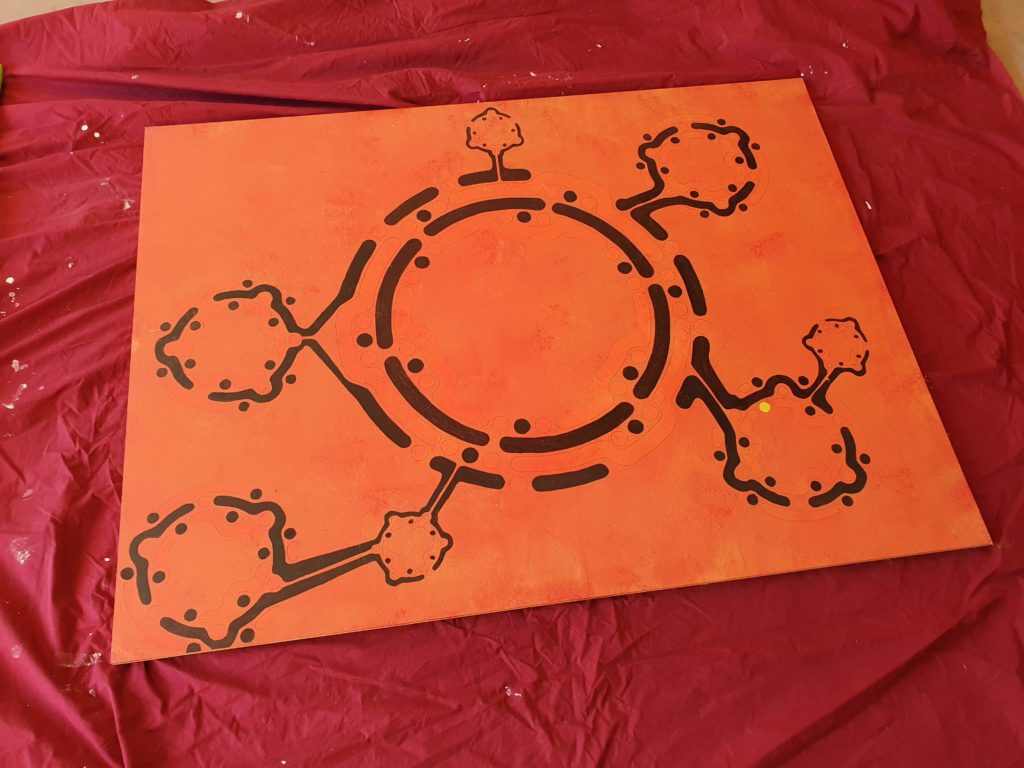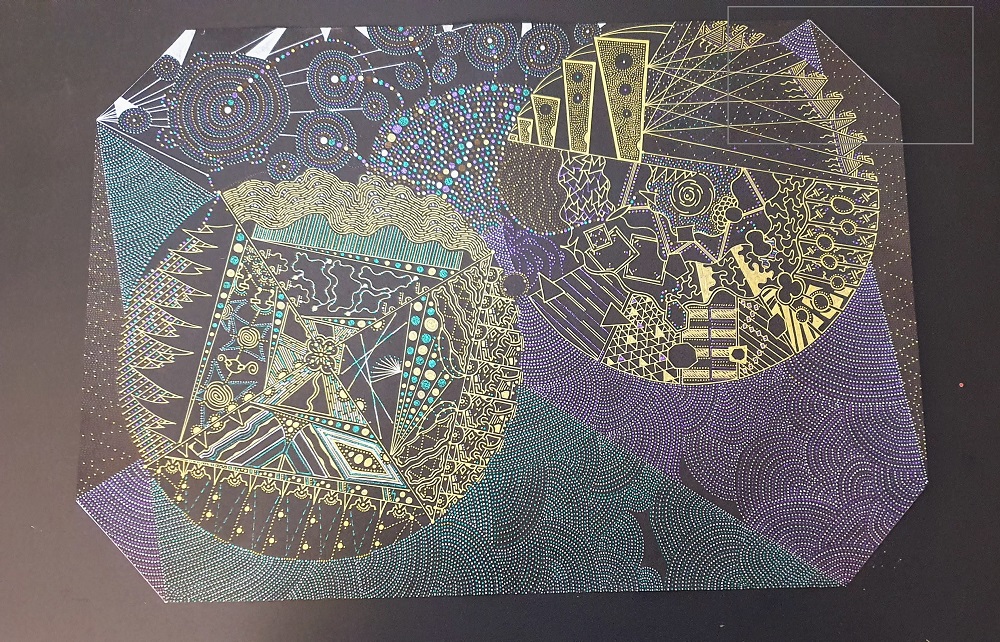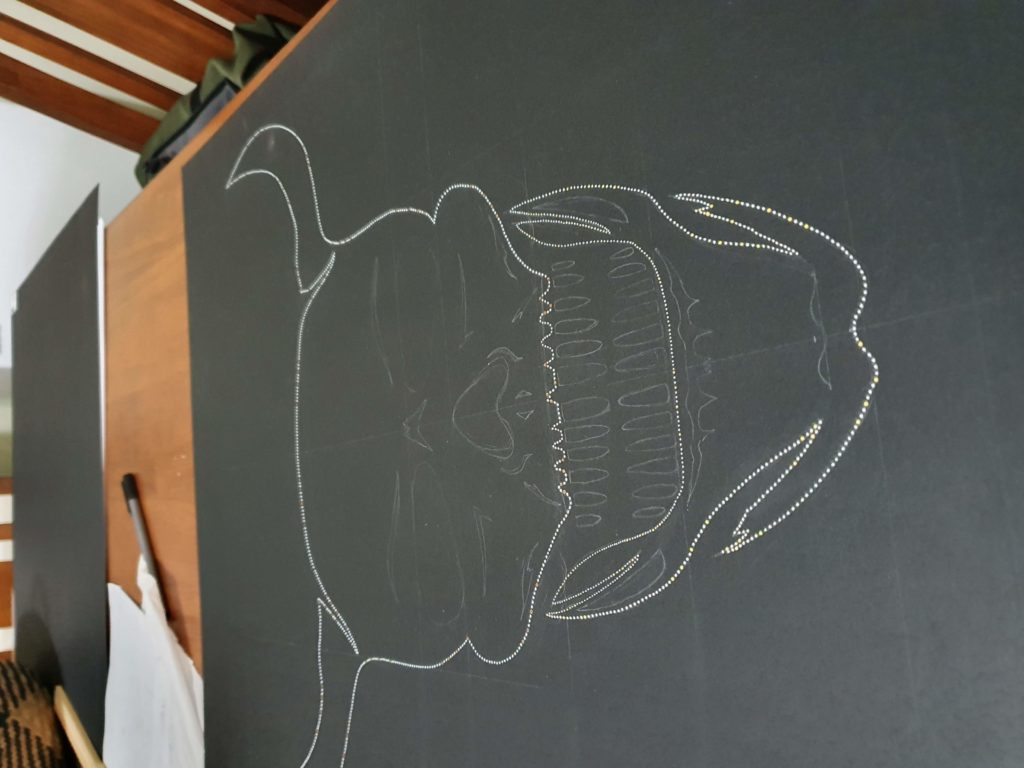
Art is a hobby of mine. I suck at it, but it is a hobby.
As with most hobbies I’ve had in my life, I tend to feel like the hobby is trying to teach me broader lessons about life.
That makes it sound a bit woo woo, but I don’t think there is any black magic going on here.
It is simply that the pursuit of a hobby is sometimes a good metaphor for the pursuit of a good life, and that the processes that work to progress you in your hobby, may have value in providing guidance on life more generally.
I’m being a bit vague. Let me tighten this up a bit.
Here are some broader life lessons I have learned along the way, as a result of reflecting on the artistic process.
Patience and incremental improvement
I do a type of art that benefits greatly from patience, rather than skill. A piece might take months because it is constructed from lots of small repeated elements.
This process constantly reminds me that good things often take time and repetition and are built through small, incremental changes.
In fact, impatience often leads to making mistakes or errors or making rash decisions that detract from the overall piece when it is finished.
How much patience? Well I have a piece of art that I only just took out and started working on again after 20 years!
In my life outside of art, I often have to stop myself and notice the frustration I feel if something is not coming together as quickly as I would like it to. I need to sit with that frustration, letting it settle, before heading back to the piece of work and just committing to make one small improvement or change. I have to trust in the process that patience and constant improvement will ultimately help me build what I need to build.

In mistakes can be found opportunities
When I am doing a piece, I often make mistakes along the way (sometimes due to impatience described above). A smudged paint line or the wrong choice of colour. When it happens I am usually infuriated at first, then sad and despondent next. I usually finish it off with some good ol’ self-criticism. In the old days, I used to just abandon the piece altogether.
In recent pieces however, I’ve learned to try and build the mistake into the overall piece of work. Re-imagine the section, be OK with a smudge, find a nifty way to hide it. Often the work I do on a piece ends up better because of having to respond and adapt to a mistake.

When I fail in life more broadly (and I fail regularly), I am getting better at sitting with that infuriation, sadness and self-criticism. Once it has passed I try to think about how I might be able to use my mistake in a helpful way. This might be as simple as ‘trying again’ or it might mean actually embracing the mistake. I remember doing a really bad presentation to a student group on ‘psychological needs’. I was distraught and embarrassed afterwards, but a few days after I used the mistake to write this post to them, where I honed in on what it is I really wanted to say to them.
Don’t cling too tightly to the idealised outcome
For some of my art pieces, I have a clear vision in my head of what it is I am trying to achieve, right at the beginning. This often ends up as a source of significant frustration though, because my pieces rarely end up how I imagined them in the first place. Sometimes the final result is completely different from what I had in my head when I started.
For many years, I think it was this that stopped me from doing art. The pieces always had a life of their own and rarely conformed to what I wanted them to be at the beginning.
Slowly however it dawned on me that the outcomes of these pieces were still really good. The endpoints were still really satisfying, even if they weren’t the endpoints I had envisaged.
I think the conceptual counterpart in life is to hold ‘goals’ lightly. Goals are great because they help give us a direction to head in, and a motivation to keep moving and trying and building stuff. But if you cling too tightly to them, you may a) get frustrated or self-critical when things don’t work out to plan (as they often do, but not because of anything you did) or b) miss the change to celebrate other different but still rewarding outcomes.
So don’t stop setting goals, but be willing to entertain that your efforts towards those goals might realise outcomes you had never considered or planned for, but that are good nonetheless.
Give to others
When I finish a piece of art nowadays, I usually gift it to someone. To me, it completes the journey of that particular piece in my life, but starts a new journey of that piece in another person’s life.
It can be a strong point of connection with people, especially when I can be somewhat clumsy in connecting with others in other ways.
In my life outside of art, this translates into me trying to be relatively generous with anything I create. I share my writing and programs quite freely and enjoy that others can find benefit in them or remix them for their own needs. I try not to cling too tightly to the work I do. Instead, I see it as only making sense if you let it out into the wider world, where it can reverberate in a different way.
The power of narrative
My art is abstract, so you can read into it different stories. However I usually have a story about what each piece means to me.
In fact, with recent pieces, when they are finished I actually write down what I think the piece is about.
Interestingly though, the story of each piece is not just important once it is finished. I find that the story of each piece develops along the way.
This happens in life more broadly as well. We are constantly writing and re-writing the story of our lives. And the version of the story we hold in our heads at any given point in time shapes the way we see and interpret the world. For example, the part of my story about being a ‘psychologist’ is strong for me at the moment, keeping me connected to my work. But in years past, my active story was one of abandoning the field, and that had specific implications for how I lived my life.
A powerful personal narrative/story is one that keeps us pushing forwards, even during difficult times. Art pieces for which I have a clear story are easier to stick with, especially when they are challenging or time consuming. Pieces where I can’t find a narrative, feel empty and confronting.
Face your fears
OK, this is a bit broad. Maybe it is more like ‘just get started’.
Often, when I am starting out on a new piece, I hesitate and freeze for fear of making an early mistake. It might take me weeks before I bite the bullet and jump in.
I try when this happens nowadays to remind myself that the consequences of not jumping in, are far worse than even making a mistake.

If I am still freaked out, I might get my sketchbook and do a mini rehearsal of the piece first. That at least gets me drawing and poised to start.
In life, we can delay big projects or decisions because of the fear of getting it wrong, making a mistake, looking silly. The longer we delay, the more anxiety we build and the cycle continues.The longer we delay, the more time we lose to have a life where the decision has been made, the project has been started.
To break that cycle means to a) get started on the project itself or b) actively rehearse or practice some aspect of the project. Either way, we have to get ourselves working on the problem at hand.
And look, it won’t always work out.
Sometimes I have to throw away a perfectly good canvas for having stuffed it up. But more often than not, once I’ve got started, most of the fear that existed beforehand evaporates. Then I let other processes take over (narrative, patience, reimagining mistakes) that I have faith in will help build a good experience.
What have you learned from your hobbies/interests?
I imagine most hobbies and interests have the capacity to inform a broader life philosophy. I could have written (and may still do) a similar post about what I’ve learned from tending to a garden.
What are your hobbies and interests? Is there wisdom in those activities that has relevance for your broader life?
Feel free to share your thoughts below.
G

